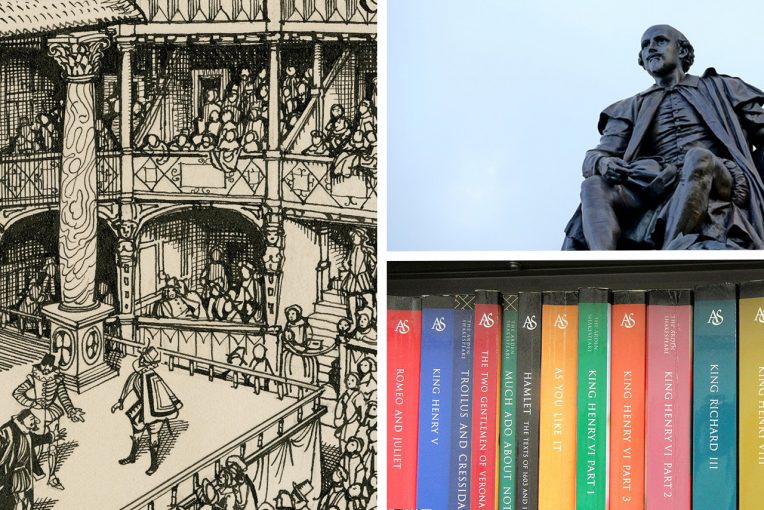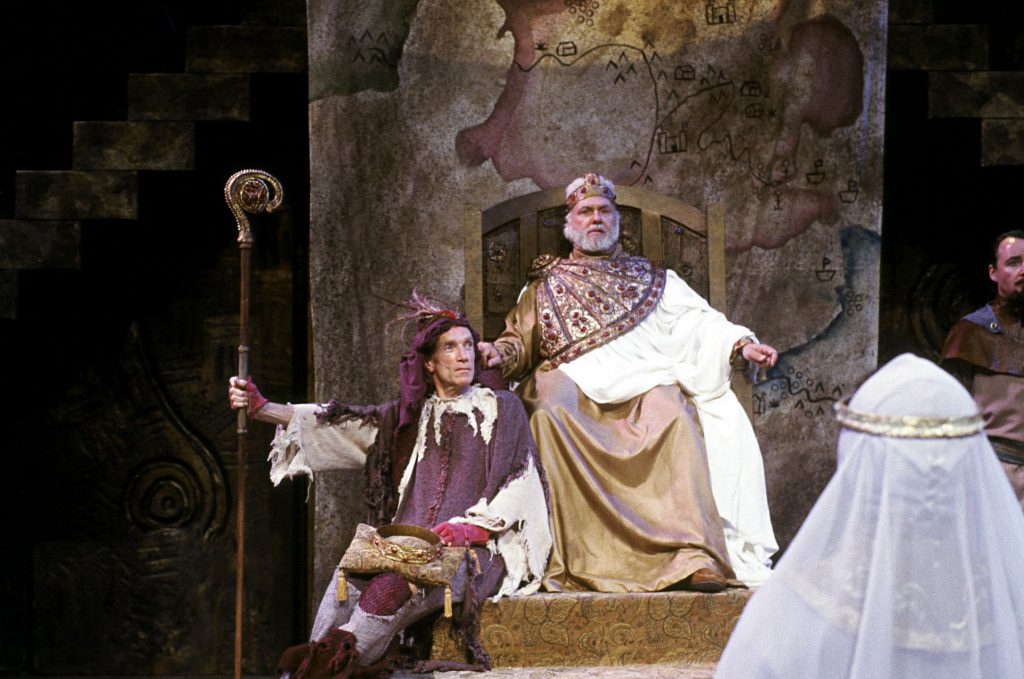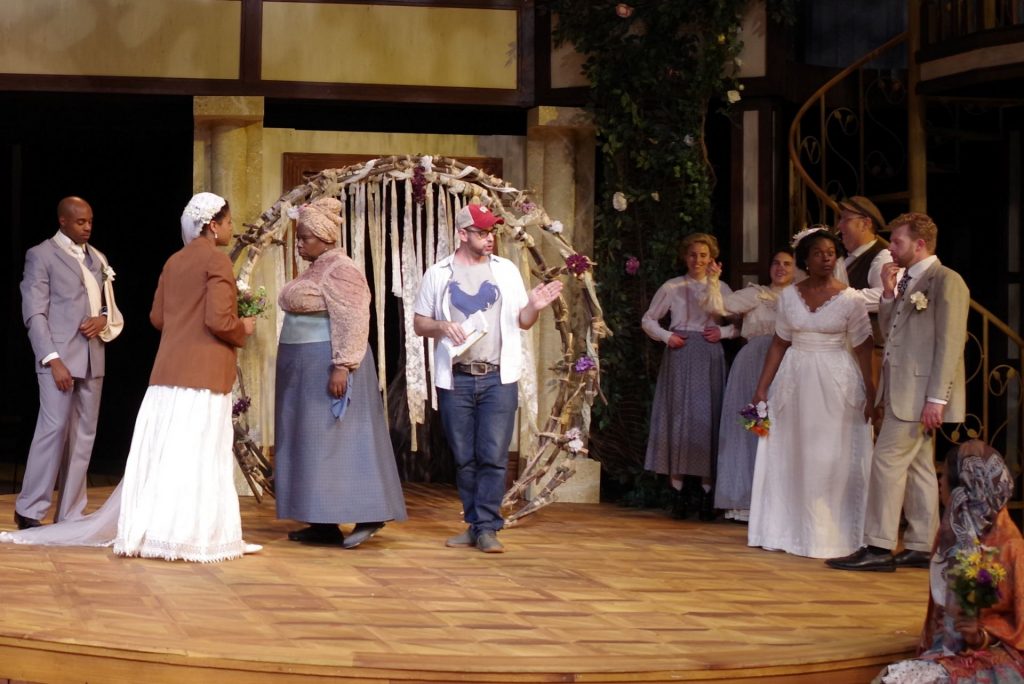Festival Dramaturg Kee-Yoon Nahm spoke with Associate Artistic Director Robert Quinlan about his upcoming production of William Shakespeare’s King Lear at the Illinois Shakespeare Festival (ISF).
Kee-Yoon Nahm (KN): You will be directing King Lear for the 2022 season. Am I correct that is this the first play that you are directing since the pandemic?
Robert Quinlan (RQ): Yes, this is the first live piece of theatre that I am directing since the pandemic.
KN: How do you feel about that?
RQ: I am ready for it. I think the break has made me a little hungrier to direct something. I was doing more acting and staged readings during the pandemic. And I really enjoyed it—finding that part of myself again. But I went away from directing on a stage, and I love that so much that I am excited to do it again. I am also intimidated, even though I have been teaching directing that whole time. There is part of me that wonders, ‘Do I even remember how to do it after two years?’ I am intimidated by the thought of directing again, and I am intimidated by this play as well—which I think is healthy. Still, it is quite the project to come back with.
KN: Right. If you are trying to ease yourself back into theatre directing, one might think you would have gone for an easier play than King Lear.
RQ: Yes, maybe it would have been smart to start with Neil Simon’s Barefoot in the Park or something like that.
KN: What about King Lear intimidates you?
RQ: I think the play defies easy answers. If you ask me what the play is about, it is about everything and it is about nothing. It is about life. Lear is life. Within the play, there are just all of these multitudes and contradictions about humanity. It is about old age and youth, fortune and despair, ego and selflessness, vision and blindness. I think what overwhelms me is the sheer scale of everything that is contained in this one play. King Lear is an epic play in that sense. Although that intimidates me, I also feel fortunate to be able to work on something that exists on so many levels. And I am excited to explore it with an acting company that encompasses a wide range of experiences. Many of the actors might know the play better than I do. So, I am also looking forward to learning about all of the layers within the text through this process.
KN: This is definitely a play that benefits from drawing on many different people’s experiences because it is a play that runs the gamut from young to old, from good to evil. With some plays, I can easily imagine a production in my head just from reading the script. That is generally harder to do with Shakespeare’s plays because they are so open to interpretation. But King Lear in particular is a play that I would say defies the imagination because it is too big to fit in one person’s mind. It is a play that must be staged in order to be understood.
RQ: A couple of weeks ago, we did a reading of the version I cut with some ISU faculty and students. And it was interesting to hear it out loud. It was a very different experience than thinking through Shakespeare’s language and plot in writing. I found myself having strange emotional responses to some moments in the play that I did not expect—such as some of the relationships between family members or old friends. Friendship is a theme in the play that I did not necessarily see until I really heard the characters talk about their history with one another. I realized during the reading that these people have spent so many years together—Lear and Kent, for example, or Lear and the Fool. I found myself moved by the many different kinds of friendships that exist in the play.
KN: It is remarkable how sometimes you think you know a play very well but hears a line as if for the first time in a performance. Speaking of that, what is your history with the play?
RQ: The first time I saw King Lear onstage was the last time we did it at the Illinois Shakespeare Festival in 2003. It was directed by Cal MacLean. It was a fabulous production.
“I found myself moved by the many different kinds of friendships that exist in the play.”
Robert Quinlan
KN: Wait, is this the production that Lisa Gaye Dixon was in? She mentioned it when I interviewed her last month.
RQ: Yes, she played the tenant. Interestingly, Henson Keys played the Fool back then, and now he is playing Lear this summer. I remember being swept away by something that took me on a journey. And although the version I am directing will be somewhat shorter than the 2003 production, I hope that it can have the same effect on the audience. I hope that people can become immersed in the story and that they can relate to the characters and find the humanity in them. I would like for people to walk away from the experience thinking of the characters in the play as real people who faced real struggles. That way, the audience can also think about how they might relate to what just happened on stage.
KN: When I imagine the world that Shakespeare has created for King Lear, my mind immediately goes in two different directions. On the one hand, the play feels like a kind of fairytale or folk story. There are Korean folktales about the youngest daughter—sometimes it is the third, sometimes the seventh—being cast out, but in the end being the most devoted child to their father. Maybe it is a universal story. We see traces of it in Cinderella’s relationship with her stepsisters, for example. On the other hand, I feel that Shakespeare exposes us to a dark, unrelenting vision of society and human nature. Treachery and cruelty permeate the world of King Lear. These two ideas do not necessarily mesh. Rather, I feel that I am being pulled in two different directions. How do you see the world of this play?
RQ: I think it is a dark world. It is relentlessly bleak in how the characters unfold through the decisions they make. The last play I directed at the Illinois Shakespeare Festival before the pandemic was As You Like It in 2019. That is a play where the characters have these epiphanies that converge towards the end of the play. They discover their better selves through their experiences in the Forest of Arden. You could say that King Lear is the opposite of that. The characters descend into the worst versions of themselves through their own blindness and their inability to see past their egos. I think that is one of the themes that the play examines: how selfishness, particularly selfishness held by someone in a position of power, can be destructive to a nation or a group. And in that sense, this play will always be relevant. The political side of this play feels very urgent and current to me. We live in a world where we see people abuse power in many different ways.
KN: On that note, I am curious how easily a contemporary audience can sympathize with a character like Lear and understand his destructive actions. I feel that right now, we are in a political moment where people—especially younger people—have lost patience with powerful old men who clutch onto their status and privilege. With all of the discouraging things we see in politics, do you think audiences will still have the capacity to feel pity for someone like Lear?
RQ: That is a great question. I do have a lot of compassion for Lear. When you look at his journey, it is tragic because he does make discoveries and learn from his mistakes. But he does it too late and he makes these realizations as he is also losing his footing in reality—that is sad to watch.
KN: Right. We see Lear regret his choices and want to make up for his mistakes. And the play very well could have ended with his redemption and healing—through his reconciliation with Cordelia. The play’s structure can accommodate that ending, which is perhaps why it is so devastating to see Cordelia and Lear’s tragic death in the end. I do not know if you know about this, but there was an adaptation of King Lear in the late 17th century by Nahum Tate. And in this version, Lear and Cordelia live to have a happy ending. Apparently, this adaptation replaced Shakespeare’s play on the English stage for over a century. It is interesting to think about why people gravitated towards this alternate version with a happy ending.
RQ: Right, they just could not handle the fact that Cordelia dies.
KN: Well, this instance shows that all of the components are there for a comforting resolution similar to As You Like It, where characters can make these discoveries and set their course straight. There is the promise of redemption and restoration. But King Lear does not give you that. The play fails to give these characters another chance.
RQ: All of those moments of discovery happen at the most tragic time when nothing else can be done and when it is no longer possible for them to go back or change the damage they have already done. Even Edmund sort of tries to make amends, but it is too late. These moments happen over and over, and I think it does hit us in the heart. The play is intentionally brutal in that way. But I do think there is some hope in the sense that some characters find their integrity in the midst of a toxic situation. Albany, for example, is able to finally see what is happening. Kent is treated horribly by Lear, but he remains loyal and tries to see the best in the king. And, finally, there is Edgar. The world of the play really becomes his to change in the end. I love the idea that those characters can start a new play that may take some lessons from this tragedy.
KN: Incidentally, those three characters you just named are some of the few survivors in the play. Most of the other major characters are casualties of the tragedy. I am especially interested in Kent as a character since he takes decisive action at important moments in the story. In a play full of betrayal, Kent is the epitome of loyalty. It is also interesting that Lear does not recognize Kent in disguise, even though it seems they have known each other for a long time. What do you make of this character?
RQ: I think Kent is a very interesting character. He has the ability to see the story from somewhat of a distance because he is in disguise as he travels with Lear. Because of that, I thought he would be a good character who could step in for the audience and narrate some of the events in the play for us. This is a change we are planning to make to the script, condensing some of the exposition-heavy dialogue into Kent’s narrations. This is also a useful way to turn what could easily be a four-hour play into a two-and-a-half-hour experience, including intermission. But aside from that, I think that, in some ways, Kent is the character who is most like us watching the play. He hopes for the best for Lear even as he fears that the worst may happen. In our production, Kent will be a kind of chorus that takes us from the beginning of the play to the very end.
KN: That makes a lot of sense since Kent is also trying to be Lear’s voice of conscience. But I find it significant that he has to be stripped of his former self—his rank, his status, his place in society—to serve that role. He has to become someone else—Caius, I think, is the name he adopts—in order to do the work that he wants to do. Perhaps there is something freeing about stripping away the things that used to define you. And that kind of stripping away of the self is the very thing that Lear is terrified of the most. He does not want to let go of the things that made him a powerful king, even as he tries to bestow his legacy onto his children.
RQ: In Kent’s case, I think that is where the distance comes from, that stripping away. Edgar does the same thing. He removes the trappings of his former life and is able to learn a lot over the course of the play—including how to see his father in a different way. I find the relationship between parents and children to be quite beautiful in this play. It is hard and honest and truthful, even though the play also shows how we can easily be so cruel to members of our own family. But at the same time, it amazingly shows how we are able to forgive when we love someone so much.
“Within the play, there are just all of these multitudes and contradictions about humanity.”
Robert Quinlan
KN: That is right. Edgar is able to forge a new relationship with his father by pretending to be a stranger to the blinded Gloucester. Again, somehow you become free when you learn to let go.
RQ: We also see a resurrection on stage when Gloucester believes that he jumped off a cliff but finds that he is miraculously still alive. There are multiple moments of resurrection in this play which I think are beautiful and mysterious. Lear’s last line in the play is “Look there, look there!” This is a line that I keep thinking about. I do not yet have the answer yet, but I wonder what he sees at that moment right before his death.
KN: Do you think there is a spiritual or perhaps ritualistic dimension to this play? Are you interested in exploring that?
RQ: Oh, absolutely. The play feels like going to church in some ways—the most visceral way of experiencing life, ethics, sin, hope, and redemption. It is a full experience of life and the soul. So, yeah, I do think there is something ritualistic about the play. It feels much more ambiguous to me than some of Shakespeare’s other tragedies. Hamlet, for example, has this statement at the center of it. It is about something concrete, as complex as it is. The ending of King Lear leaves us with more questions. I do like that about the play.
KN: I am excited to delve into the mystery of this play with you later this summer.




